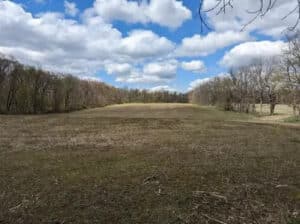With 2023 coming to an end, News To Us celebrates recent local and state environmental wins like land protection in Webster Township, state-level clean energy legislation, and Michigan outdoor industry growth. In honor of the first day of winter, there are seasonal stories about winter water monitoring by Friends of the Rouge and new studies on changing snowfall from the National Oceanic and Atmospheric Administration.

144-acre Webster Township farm protected in conservation deal 16 years in the making
Webster Township’s farmland and open space preservation program has purchased a conservation easement on a 144-acre farm north of Dexter, protecting an 846-acre block of conserved land. The permanent deed restriction ensures the land will never be developed while remaining in private ownership. Webster Township’s farmland and open space initiative is one of several in Washtenaw County aiming to protect green space and fight urban sprawl.
Michigan sees another year of double-digit growth for outdoor industry
Driven by the COVID-19 pandemic, Michigan’s outdoor recreation sector experienced 11.8 percent growth in 2022. Outdoor recreation accounted for 2 percent of the state’s GDP and added $12.4 billion to the economy. Employment grew by 7.2 percent, with snow activities seeing the greatest surge. Outdoor-related retail, including bait-and-tackle shops and lodges, made up 33 percent of Michigan’s outdoor sector. However, Michigan’s performance was middling compared to other Great Lakes states, and concerns about its long-term economic well-being remain.
Michigan will implement ambitious clean energy mandates with the goal of carbon-free electricity by 2040
Under its new Clean Energy & Jobs Act, Michigan is implementing a clean energy mandate to be carbon-free by 2040. The state will join four other states across the US in requiring utility providers to transition to 100 percent carbon-free energy generation. Michigan also set a goal for utilities to generate 50 percent of their energy from renewable sources by 2030, a significant leap from the current 12 percent. The clean energy package is in line with the Biden administration’s goals of a carbon pollution-free electricity sector by 2035 and a net-zero emissions economy by 2050. For more information on this historic package of bills, read a recent blog by HRWC Executive Director, Rebecca Esselman.
Nonprofit group tests for road salt in the Rouge
This winter, the Friends of the Rouge (FOTR), a neighboring watershed protection group in Southeast Michigan, will conduct tests to assess chloride contamination in the Rouge River thanks to a grant from the Michigan Department of Environment, Great Lakes and Energy (EGLE). Road salt runoff is a known problem in urban watersheds, and FOTR has been monitoring salt levels in the Rouge River since 2020. The goal is to provide EGLE with data to pinpoint chloride sources and potentially remediate watershed salt contamination.
Snowfall is changing across the globe, new maps show
A new analysis by the National Oceanic and Atmospheric Administration indicates a global decline in snowfall since 1973, particularly in the Northern Hemisphere’s mid-latitudes, which threatens to exacerbate warming and impact food and water supplies. While some regions, like the Northeast US, may experience temporary increases in snowfall due to climate change, the overall trend is toward less snow as precipitation transitions from snow to rain in a warmer world. This shift poses a significant threat to water supplies, especially in climates with boom-and-bust precipitation cycles, such as California, where declining snowpack levels impact water availability for agriculture, ecosystems, and cities.



